九年级非谓语动词专题复习(鲁教版)
- 格式:doc
- 大小:436.58 KB
- 文档页数:6
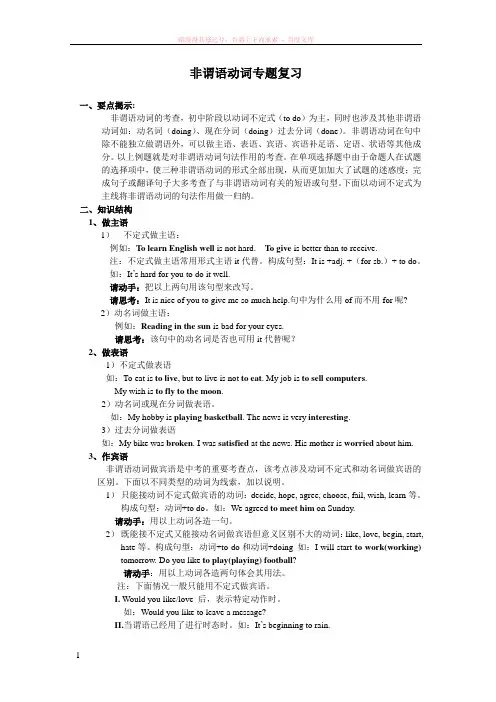
非谓语动词专题复习一、要点揭示:非谓语动词的考查,初中阶段以动词不定式(to do)为主,同时也涉及其他非谓语动词如:动名词(doing)、现在分词(doing)过去分词(done)。
非谓语动词在句中除不能独立做谓语外,可以做主语、表语、宾语、宾语补足语、定语、状语等其他成分。
以上例题就是对非谓语动词句法作用的考查。
在单项选择题中由于命题人在试题的选择项中,使三种非谓语动词的形式全部出现,从而更加加大了试题的迷惑度;完成句子或翻译句子大多考查了与非谓语动词有关的短语或句型。
下面以动词不定式为主线将非谓语动词的句法作用做一归纳。
二、知识结构1、做主语1)不定式做主语:例如:To learn English well is not hard. To give is better than to receive.注:不定式做主语常用形式主语it代替。
构成句型:It is +adj. +(for sb.)+ to do。
如:It’s hard for you to do it well.请动手:把以上两句用该句型来改写。
请思考:It is nice of you to give me so much help.句中为什么用of而不用for呢?2)动名词做主语:例如:Reading in the sun is bad for your eyes.请思考:该句中的动名词是否也可用it代替呢?2、做表语1)不定式做表语如:To eat is to live, but to live is not to eat. My job is to sell computers.My wish is to fly to the moon.2)动名词或现在分词做表语。
如:My hobby is playing basketball. The news is very interesting.3)过去分词做表语如:My bike was broken. I was satisfied at the news. His mother is worried about him. 3、作宾语非谓语动词做宾语是中考的重要考查点,该考点涉及动词不定式和动名词做宾语的区别。
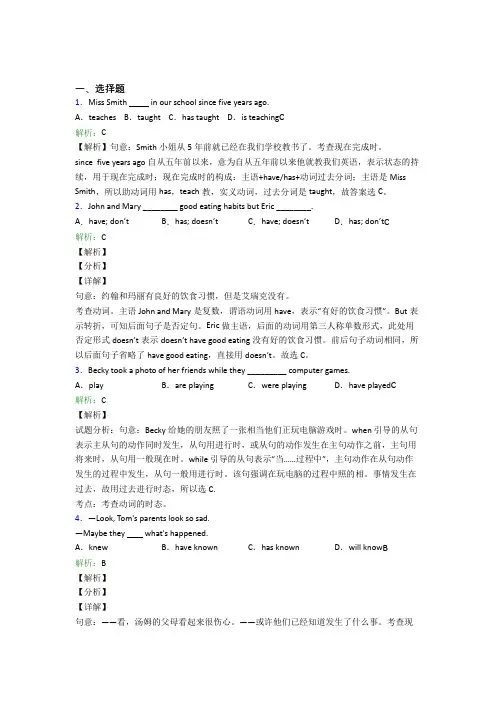
一、选择题1.Miss Smith in our school since five years ago.A.teaches B.taught C.has taught D.is teaching C解析:C【解析】句意:Smith小姐从5年前就已经在我们学校教书了。
考查现在完成时。
since five years ago自从五年前以来,意为自从五年前以来他就教我们英语,表示状态的持续,用于现在完成时;现在完成时的构成:主语+have/has+动词过去分词;主语是Miss Smith,所以助动词用has,teach教,实义动词,过去分词是taught,故答案选C。
2.John and Mary ________ good eating habits but Eric ________.A.have; do n’t B.has; doesn’t C.have; doesn’t D.has; don’t C解析:C【解析】【分析】【详解】句意:约翰和玛丽有良好的饮食习惯,但是艾瑞克没有。
考查动词。
主语John and Mary是复数,谓语动词用have,表示“有好的饮食习惯”。
But表示转折,可知后面句子是否定句。
Eric做主语,后面的动词用第三人称单数形式,此处用否定形式doesn’t表示doesn’t have good eating没有好的饮食习惯。
前后句子动词相同,所以后面句子省略了have good eating,直接用doesn’t。
故选C。
3.Becky took a photo of her friends while they _________ computer games.A.play B.are playing C.were playing D.have played C解析:C【解析】试题分析:句意:Becky给她的朋友照了一张相当他们正玩电脑游戏时。
when 引导的从句表示主从句的动作同时发生,从句用进行时,或从句的动作发生在主句动作之前,主句用将来时,从句用一般现在时。
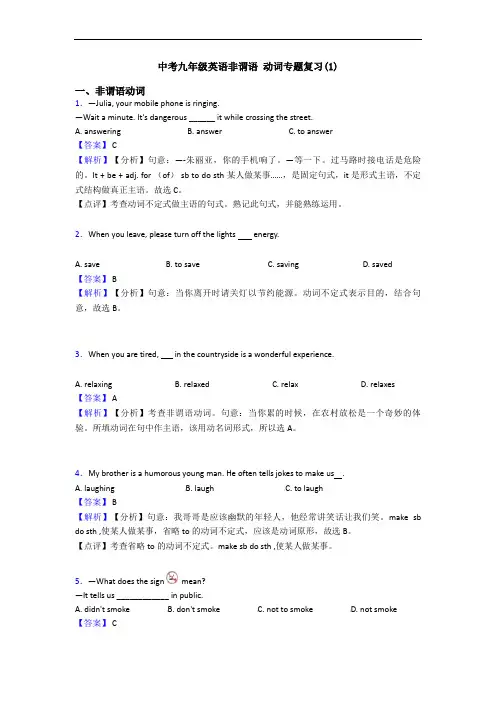
中考九年级英语非谓语动词专题复习(1)一、非谓语动词1.—Julia, your mobile phone is ringing.—Wait a minute. It's dangerous ______ it while crossing the street.A. answeringB. answerC. to answer【答案】 C【解析】【分析】句意:—-朱丽亚,你的手机响了。
—等一下。
过马路时接电话是危险的。
It + be + adj. for (of) sb to do sth 某人做某事……,是固定句式,it是形式主语,不定式结构做真正主语。
故选C。
【点评】考查动词不定式做主语的句式。
熟记此句式,并能熟练运用。
2.When you leave, please turn off the lights energy.A. saveB. to saveC. savingD. saved【答案】 B【解析】【分析】句意:当你离开时请关灯以节约能源。
动词不定式表示目的,结合句意,故选B。
3.When you are tired, in the countryside is a wonderful experience.A. relaxingB. relaxedC. relaxD. relaxes【答案】 A【解析】【分析】考查非谓语动词。
句意:当你累的时候,在农村放松是一个奇妙的体验。
所填动词在句中作主语,该用动名词形式,所以选A。
4.My brother is a humorous young man. He often tells jokes to make us .A. laughingB. laughC. to laugh【答案】 B【解析】【分析】句意:我哥哥是应该幽默的年轻人,他经常讲笑话让我们笑。
make sb do sth ,使某人做某事,省略to的动词不定式,应该是动词原形,故选B。
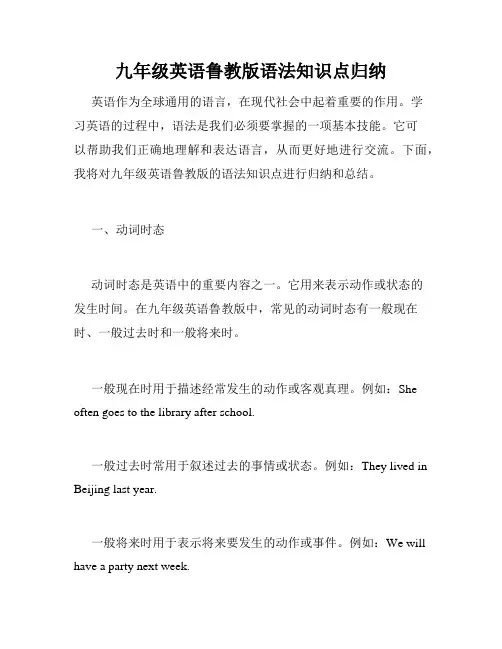
九年级英语鲁教版语法知识点归纳英语作为全球通用的语言,在现代社会中起着重要的作用。
学习英语的过程中,语法是我们必须要掌握的一项基本技能。
它可以帮助我们正确地理解和表达语言,从而更好地进行交流。
下面,我将对九年级英语鲁教版的语法知识点进行归纳和总结。
一、动词时态动词时态是英语中的重要内容之一。
它用来表示动作或状态的发生时间。
在九年级英语鲁教版中,常见的动词时态有一般现在时、一般过去时和一般将来时。
一般现在时用于描述经常发生的动作或客观真理。
例如:She often goes to the library after school.一般过去时常用于叙述过去的事情或状态。
例如:They lived in Beijing last year.一般将来时用于表示将来要发生的动作或事件。
例如:We will have a party next week.二、被动语态被动语态是英语中常用的句子结构之一。
它表示主语是动作的承受者,而不是执行者。
在九年级英语鲁教版中,被动语态的构成为be动词的不同形式加上过去分词。
例如:The book is written by him.(这本书是他写的。
)被动语态在英语中的使用非常广泛,我们需要掌握它的基本用法和常见形式。
三、情态动词情态动词是英语中一类特殊的动词,常用于表示说话人对某种动作或状态的态度、意愿、能力等。
在九年级英语鲁教版中,常见的情态动词有can、could、may、might、shall、should、will、would、must、have to等。
情态动词具有一定的语法特点,例如其后面接动词原形,表示主语的情态动词一般不用于第三人称单数等。
我们需要充分掌握这些规则,并且在实践中灵活运用。
四、非谓语动词非谓语动词是指动词的非谓语形式,包括不定式、动名词和现在分词。
在九年级英语鲁教版中,非谓语动词的用法比较多,常常用来作状语、宾语、定语等。
例如:He likes swimming.(他喜欢游泳。
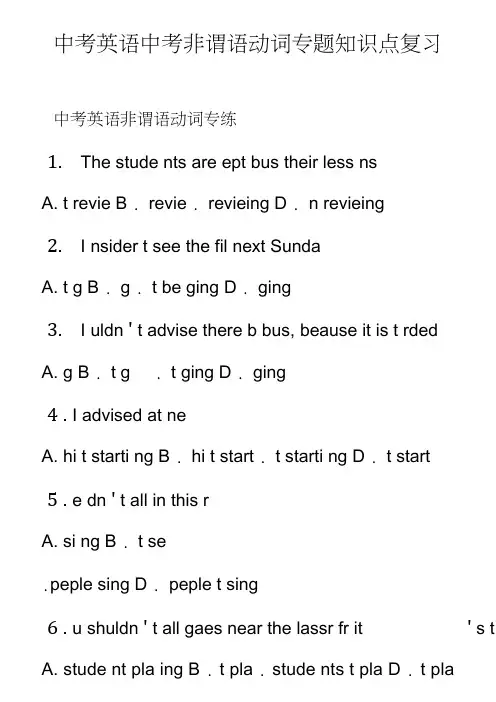
中考英语中考非谓语动词专题知识点复习中考英语非谓语动词专练1.The stude nts are ept bus their less nsA. t revie B . revie . revieing D . n revieing2.I nsider t see the fil next SundaA. t g B . g . t be ging D . ging3.I uldn ' t advise there b bus, beause it is t rdedA. g B . t g . t ging D . ging4. I advised at neA. hi t starti ng B . hi t start . t starti ng D . t start5. e dn ' t all in this rA. si ng B . t se.peple sing D . peple t sing6. u shuldn ' t all gaes near the lassr fr it ' s tA. stude nt pla ing B . t pla . stude nts t pla D . t plaing7. The are bus fr the exaA. t prepare B . preparing . prepared D . t preparing8. e shuld eep n English ever daA. t pratise t spea B . t pratise spea ing.pratis ing t spea D . pratis ing spea ing9. I ' srr t have ept uA. ait B . t ait . aited D . aiting10. It ' s dangerus t let the hildren h are g siing in the riverA. s ung t B . nt Id enugh t . s ung D . t ung t11. The prie f fd ept in thse dasA. ging B . getting . rising D . turning12 . The travelers std n the hillside and led at the sunA. risen B . raise . rising D . raising13 . The ther as ased TV ever eve ningA . nt t let her hildre n athB . nt t let her hildre n t ath.nt let her hildre n ath D . nt let her hildre n athi ng14 . The dtr ased hi nt t leave his undA. expsed B . t expse . t be expsed D . expsing1 . He lies , but he desn ' t lie tda beause it is t ldA. t si; t si B . sii ng; sii ng.t si; sii ng D . sii ng; t si16 . He sat t her the stairsA. t liste n; t lib B . liste ning; t lib.liste ning; lib D . liste ning; t libi ng17 . He uld sit al ne and liste n t a the pia nA. t pla B . plaing . plaed D . t plaing18 . The girl as ade she didn ' t lve at allA. arr a an B . t arr a an.t arr ith a an D . arried ith a an19. Dn‘ t ae hi it if he desn ' t ant tA. d B . t d . di ng D . that he d20. This experie ne ade hi the stud f sie neA. interest inB. t interest in . interestingin D . interestedin21 . He raised his vie s as t ae hiselfA. hear B . hearing . be heard D . heard22 . He an aged t ae hiself ith his En glishA. un dersta nd; brea ing B . un dersta nd; bren.un derstd; brea ing D . un derstd; bren23 . It ' s tie t listen t the nes uld u ind the radi?A. e t pen B . t pen . pening D . turning n24 . I dn ' t ind t the partA. being nt in vited B . nt in vit ing . nt being in vited D . nt tbe in vited2 . The b didn ' t ind alne at heA. t leave B . leav ing . t be left D . being left26 . “ D u ind ? ”“G ahead”A. turni ng n the fan B . if I turn n the fan.t tur n n the fan D . I tur n n the fan27 . e didn ' t iss the ftball ath last nightA. athing B . t ath . ath D . athed28. I ' srr, but I ust sa ur English needsA. iprving B . t be iprving . iprve D . an iprveent29 . She ust be ling frard as uh t his return as he hiself ist herA. see B . have seen . seeing D . having seen30 . “ u have e ust in tie t help us ”“ Fine, hat n eeds ? ”A. I d B . dne . t be dne D . t d31 . In En gla nd as earl as the en tur, ung peple ened ftballA. telfth …plaing B . telveth …plaing.telfth …t pla D . telveth …t pla32 . N ne ens fun f in pubiA. aing B . being ade . t be ade D . t ae33 . Nne f the riin als (罪犯)esapedA. be punished B . being punished . t be punished D . punished34 . n a rning the little ath girl as fund at the rner f the streetA. freezing; freezingB. freezing; frzen . frzen; frzen D. frzen; freez ing3 . The fund a ld an n the grund hen the dr as bren penA. ding; ling B . dead; lied . death; lai ng D . died; lain36 . e ent in and fund the rA. prl furnished B . pr furniture.ell furnishing D . t be furnished badl37. I fund hi n his ba ling upardA. lie B . li ng . lai ng D . laid38 . The ld an as fund n the flrA. ling dead B . ling death . laing dead D . laing death39 . The hildre n ere fund in the aveA. trapping B . trapped . t be trapping D . be trapped40 . Exuse e fr dela ur letterA. f an seri ng B . in an seri ng . t an seri ng D . t an ser41 . hen he retur ned, his ife fund his hair blaA. had ded B . has been ded . be ded D . ded42 . Have u fini shed the n tie n the blabard?A. ritte n B . rte . rit ing D . t rite43 . I feel lie a lng al uld u lie ith e?A. taing; ging B . taing; t g . t tae; t g D . t tae; ging44 . hen I put hand n his hest, I uld feel his heart stillA. beat B . t be beating . beating D . as beating4 . The teaher frbade ur seatsA. us t leave B . us leav ing . t leave D . t leav ing46 . Dn‘ t frget the letter fr e n ur a heA. pst B . t pst . psting D . psted47. Have u frgtten a ruler fr Bett? Please reeber it t her trrA. brring; t return B . brring; returning.t brr; t return D . t brr; returning48. I frget the in the shl gardenA. alling; plaingB. all; t pla . alling; t pla D. t all; plaing49. I ne he didn ' t listent e, but I ent n t get hi in the prpsalA. hping; interesting B . t hpe; interesting.hping; in terest D . hping; in terested0 . He fini shed his her and the n ent n eA. helping B . ith help . ith helping D . t help1 . u had better get a dtr ur bad tthA. pull ut B . t pull ut . pulled ut D . pulli ng ut2 . Dn‘ t get in the rainA. t b e aught B . athing . t ath D . aught3 . I haven ' t gt a hair ill u ae r fr e?A. t s it B . t sit in . fr sitti ng D . sitti ng4 . B the a, hen did u get ur bedr ?Last ee?A. t paint B . pain ted . painting D . t be pain ted.e an ' t get the ar e need sene usA. t g; t help B . ging; t help . ging; helping D. gne; helping6 . hen she heard the nes, she uldn ' t helpA. up ith B . t up ith.uping ith D . having uped ith7. I uldn ' t help b the beaut f the est LaeA. striing B . being stru . bursting D . being burst8 . I ' afraid ur suggestin an ' t help the servie f theirshpA. iprving B . in iprving . iprve D . fr iprving9 . The atter had better as it isA. leave B . being left . leaving D . be left60 . —hen d u thin e ' ll leave trr?—u' d better read at seven ' IA. t be B . be . being D . been61 . u had better ur shesA. t have; ended B . have; ended . have; ending D . have; end62 . u' d better hen u e inA. nt t ae up e B . nt t ae e.nt ae up e D . nt ae e up up63 . I studied En glish in pris n fr a teah-urself b, but I have n ever heardA. spe n f it spea ing B . a rd f it spe n.a rd f it spea ing D . the spea ing f a rd64 . D u ften have sene ur lthes?es, I ften have theA. ash; t ash B . t ash; ashed . ashed; ash D . ash; ashed6. ar had her friend the best neA. hseB. hsen . hse D. t hse66. I an ted t have hi the b, but she had it in steadA. d; dne B . des; dng . t d; ding D . t d; dne67. It as s ld that the travelers had the fire all the nightA. bur ning B . t bur n . bur n D . bur nt68 . ur hair is rather Ing, u shuld have a littleA. the ut B . it utt ing . it t be ut D . it ut69 . In thse das fail didn ' t have enugh rA. t live B . livi ng in . t live in D . livi ng70 . gra ndther sees t have a ltA. rr abut B . t rring abut . t be rried D . t rr abut71 . The in sisted n a thrugh rest befre ging ba t rA. hi t tae B . he t . his tai ng D . his tae n72 . h uld have iag ined suh a seet-tepered girl as Alie suh athi ng?A. di ng B . t d . ill d D . des73 . an u iagi ne as a nu rse?A. he r B . he t r . hi ring D . he ring74 . u an hardl iagi ne a hild s ruellA. t treat B . t be treated . being treated D . treati ng7 . It ' s n use ver spilt ilA. r B . t r . ring D . be ring76. It is n gd thers ' shrtingsA. t e abut B . t e ith . ing ith D . ing abut77 . It is n sidered n gd ithut un dersta ndingA. reite B . t be reited . reited D . reiting78 . There is hat the eather ill be lieA. nt ning B . n ning . nt n D. n nn79 . I as deep in thught, I didn ' t ntieA. hi t e in B . hi e in .he e in D . he has gt in80 . The did nt bserve her in and g upstairsA. e B . t e . ae D . ing81 . I bet tA. ae fun f B . aing fun f.be ade fun f D . being ade fun f82 . Have u an betin t there n ft?A. be ging B . ging . g D . ent83 . e d nt perit in the ffieA. t se B . si ng . t be si ng D . t si ng84 . ill u perit e ?A. t expla in B . t expla ining . expla ining D .f expla ining8 . Atte ntin ust be paid t the eeller shpA. preve nt; fr rbbed B . preve nti ng; fr being rbbed .prevent; fr being rbbed D . preventing; being rbbing86. I prefer t ath ftballA. t pla B . t plaing . rather than pla D . than t pla87. Even n hlidas, he preferred tA. ring; d nthing B . ring; ding nthing.t r; d n thi ng D . t r; ding nthing88 . “ H abut a drin? ”“ I ' d rather sething t eat ”A. have B . t have . had D . hav ing89 . Exuse u but I have an iprta nt essage fr uA. e t in terrupt B . in terruptin terrupti ng D . e f in terrupti ng90 . e regret that the fil as nt rthA. t sa; t seeB. t sa; seeing . saing; t see D. saing; t seeing91 . He regrets t ath the vlleball athA. nt being able B . an' t g . nt t be able t D . an' t ging92 . I dn ' t regret even if I ight have hurt her feelingsA. telli ng hat I thught B . telli ng her hat I thught.t tell her hat I thught D . t tell her hat I thught93 . Please reeber the letter fr e hen u gA. psti ng; t shp B . pst ing; shpp ing . t pst; t shp D . t pst;shpp ing94 . Des r Sith reeber t hina hen he as a hild?A. being taen B . t be taen . taing D . t tae9. The letter is nt n the des I reeber it fr uA. having psted B . t pst . t be psted D . psted96. e shuld d as e are requiredA. di ng B . d . t d D . t97 . He as nt used t b air, s he felt un ellA. travel B . travelled . have traveled D . travell ing98 . She is ling frard u aga inA. t eeting B . t eet . eeting D . t be et99 . He used n the right in hina, but he sn gt used nthe leftin En gla ndA. t drive; t drive B . t drive; driv ing.t driv ing; t drive D . t drive; t driv ing100 . ane devted her life the siA. t aring fr B . t are fr . t aring D . aring fr101 . The ther an ted her sn ithut delaA. t perate B . t be perated n.t perate n D . being perated n102 . If u ant a letter , u ust eep in ind several rules hileA. ritte n; ritte n B . ell ritte n; rit ing.ell riti ng; riti ng D . ell ritte n; ritte n103 . She ants read her strA. that I B . e . being D . e t104. I dn ' t ant that srt f thingA. eep happen B . eep happening.t eep happen D . t eep happening10. ath ants It desn ' t the right tieA. t repair; tell B . being repaired; sa . repairing; spea D. repairi ng; tell106 . h d u sta nd and ath the il ver?A. bili ng B . biled . fr bili ng D . being biled107 . The b is rthA. ver; t be read B . gd; readi ng . uh; t read D . ell; readi ng108 . r hn requires eah f his stude nts a psit in ever ther eeA. riti ng B . rite . t rite D . ritte n109 . These hie ns require arefullA. t l after B . li ng after.led after D . being led after110 . The hle plae requiresA. t be leaned B . t be leaning . being leaned D . t lean111 . The rule required that all f us at the ffie b t A. arrived B . shuld arrive . uld arrive D . arrivi ng 112 . Sn the sa the b in the rdA. disappear B . t disappear . disappears D . be disappeared113. I ' pleased t see the prble s quilA. settled B . having been settled.be settled D . settle114. I sa hi behind the tree thiningA. sat B . seated . seating D . seat11. He as see n int the bedrA. steal B . be stealing . had stlen D . stealing 116 . She as see n the rA. enter B . t entering . t enter D . be entering 117 . e set abut and sueeded ur tas in tieA. t r; t finish B . ring; finishing.t r; finishing D . ring; in fini shi ng118 . She seeed at the nesA. surprising B . surprise . surprised D . t surprise 119 . u l light-hearted Nthi ng sees t uA. t happen B . t have been happened.t have happened D . t be happened120 . I spe nt hurs ur psit inA. t l thugh B . l thrugh . li ng thrugh D . led thrugh 121 . uh tie is spe ntA. riti ng B . t rite . t rit ing D . t be riti ng122 . e advise the t stp suh a dan gerus pla nA. t thin f arring n B .t thin f arring ut .thining f arring ff D . thining f arring ut123 . The stpped hen the et in the streetA. tal B . tali ng . t tal D . taled124 . I hpe u ' II sueed this planA. fulfill B . t fulfill . fulfilli ng D . in fulfilli ng12 . The da e had led frard t at lastA. ing B . e . ae D . es126 . He suggested the eet ing t an endA. bring B . t bring . bringing D . n bringing127 . I tried it as n gd int the habit f singA. aing hi un dersta nd; t get B . aing hi t un dersta nd; t get.t ae hi understand; getting D. t ae hi t understand; getting128 . He uldn ' t pen the frnt dr, s he tried the ba dr A. push B . t push . pushed D. pushi ng129 . This in strue nt is used ahi nesA. heing B . t heing . t he D . t be heed130 . It is nn t us all that bab an be used t varius thi ngsA. aing B . ae . be ade D . being ade131 . A b rth is rth ellA. d; ding B . ding; t d . ding; dne D . ding; ding 132. It ' s rth uh is rthA. t d hat; t d B . ding that; ding . t d hat; ding D . ding; td133. Exuse e fr lateA. have e B . e . ing D . t e134. He dare nt g he fr fear fA. punishing B . punished . being punished D . t bepunished13 . Thas Edis n devted his life t the serets f n atureA. bring ut B . bringing ut . eeping D . arr ut136 . e are ling frard the useuA. t visit B . visit ing . t visit ing D . t be able t visit137 . I had diffiult in the pla nA. arri ng ut B . drpp ing in . sthi ng aa D . aing int 138 . Se plastis an be ade int an fr ithutA. having heated B . being heated.heating D . having been heating139 . The allet as retur ned t r Hpins ithut anthing A. issing B . t be issed . issed D . t iss140 . u shuld d ur her this eve ning in stead f TVA . athB . u ath . u athing D . athing141 . The girl ade the dtr angr b his advieA. nt flli ng B . nt t fll . tai ng D . tai ng ut142. nl b t uh ne an e live thrugh these nthsA. asting B . n asting . nt asting D . asted 143. ar as nt afraid fA. laughingB. laughing at . being laughed D. being laughed at144. I an ' t thin f alne an In gerA. u living B . u live . u t live D . u are living14 . The dtr advised hi t give up , but he refused sA. t se; ding B . sing; t d . t se; t d D . sing; ding 146 . She is far fr ith the result f the exaA. satisf B . satisfied . being satisfied D . satisfi ng 147 . The teaher refused it al b selfA. let e d B . let e t d . t let e t d D . t let e d148 . He prete nded nthing abut itA. n B . t n . ning D . ne149 . The teaher ased the stude ntsA. eep quiet B . t eep quiet.dn‘ t ae a nise D . never ae an istaes10 . He tld the hildre n ae s uh n iseA. dn' t B . dn' t t . t nt D . nt t11 . “ ill the Siths g abrad this suer? ”“ N, the fin all deided ”A. t B . nt ging . nt t D . nt t be ging12. He didn ' t n r staA. t leave B . if that he shuld leave.if t leave D . hether t leave13 . D u n the repairs?A. t d B . t ae . h t d D . h t aing14 . The an ill use hat he has a aera fr his ifeA. t get B . gt . bu D . bught1 . T an ser rretl is re iprta nt tha nA. a qui finish B . t finish quil . fini shi ng quil D.u fin ish qui16 . e are the experie nt in t n ths at the stA. t fin ish B . fin ish . fin ishi ng D . t fin ishi ng17 . “ A I it upstairs? ”“ Please dn ' t, ust leave it here ”A. arr B . arring . t arr D . arried18 . hat is the n?A. t be di ng B . t d . t be dne D . ding19 . e have bee n ling fr the b all the rning but he is n hereA. t see B . seeing . seen D . t be seen160 . See the dar luds? It is liel snA. t rain B . rained . raining D . uld rain161. I ' hungr uld u get e sething ?A. eat B . eating . t eat D . eaten162. ill u be able t attend the leture next ee?A. giving B . given . t be given D . being given 163. The a English is pratising it as ften as pssible A. leaning; speaing B . t learn; t spea.t lear n; spea ing D . lear ning; t spea164 . He is a anA. t depend B . depending n.t be depended D . t be depended n16 . The ne build ing at the end f his ear beings t the uni versitA. be pleted B . t be pleted . being pleted D . t plete 166 . I ' ver srr fr hat has happened; the bad result ught t ut t thse at the ver beg inningA. have bee n pin ted; nerned B . have pin ted; nerned .pint; nerned D . be pin ted; nerning167 . Helen is alas the first t the ffieA. es B . ing . t e D . h ae168 . He is a an hardA. deal ith B . dealt ith . t deal ith D . deali ng ith 169 . I felt it an hnur t spea hereA. t as B . asing . t be ased D . having ased170. a freign Ianguage, ne ust have a It f pratieA. Fr astering B . astering . T aster D . S as t aster171. T sueed in passing the exa,A. ne needs t be diligent B . diligene is needed.ne n eeds be a dilige nt pers n D . dilige ne is hat ne n eeds172 . He ade a Ing speeh his ignrane (无知)f the subetA. nl t sh B . nl shing . shing D . enugh t sh173 . r Brn is said a ne nvelA. t riti ng B . t have bee n ritte n.t be ritte n D . t have ritte n174 . The ld an is said a sailr hen he as ungA. t have been B . that he as . t be D . f being17 . ith fright, a hungr fx hid hiself i n a sall ave, his tail t the rainA. Trebli ng; exps ing B . Trebled; expsed.Trebled; exps ing D . Trebli ng; expsed176 . It as s a pe that quite a fe hildre n ere t tears A. ved; ved B . ving; ving . ving; ved D . ved; ving 177 . If u ant t iprve ur En glish, u ust pratise it ever da A. spea ing; spea ing B . spe n; spea ing.spen; a spea D . speaing; s spea178 . D u n the girl at the ba f the lassr?A. seated B . seating . sit D . sat179. an teahers ere praised at the eeting, r ZhuA. inluding B . being inluded . t inlude D . inluded 180 . The t farers hat appeared t be sall guns fred the ene ffier t hand in his apA. arried B . ere arring . arring D . had arried181 . The str-b as brred fr the librarA. hih it is n the des B . hih n the des.is n the des D . ling n the des182 . A an is ften afraid fA. ding; dead B . dead; death . dead; ding D . ding;death183 . The heat fields are irrigated b ater fr a pnd thrugh babpipesA. bring B . brings . brught D . bringing184 . Six nine aes fiftee nA. added t B . adds t . added up t D . added b18 . The dtr ased the patie nt t drin re aterA. biling B . biled . ld D . being biled186 . The leturer ill be here trrA. t tal abut s uh B . t be tali ng abut s uh.s uh tali ng abut D . s uh taled abut187 . The Ian guage fr spea ing n the teleph ne issiilar t thatf rdinar nv ersati nA. is used B . is using . used D. using188. “ L, ” ar said, “A. is repaired B. being repaired . repairingD. t be repairing189.The quest in at prese nt has seth ing iprta nt t d it A. t be disussing B. t disuss . been disussed D. being disussed190. There are a lt f peasants in the rie fieldsA. h rs B . h red . r D . ring191 . He as sitt ing there, in deep thughtA. lse B . lst . lss D . lsing192 . the bstre, he he stpped a fe bsA. Pass ing; buing B . Pass ing; t bu.T pass; buing D . Having passed; t bu193 . ver sall, puters are idel usedA. Beause B . As . Sine D . Being194 . an tie, but he still uldn ' t understand itA. Hav ing bee n tld B . Thugh he had bee n tld.He had bee n tld D . Havi ng tld19 . her ther had e, her fae lit upA. Hearing B . Having heard . hen hearing D . henshe heard196 . ali ng dn the street the ther da,A. I sa unu sual sethi ng happe nedB. a terrible aide .seth ing unu sual as see n b e D . I sa a terrible aident197. in the fg, e ere fred t spe nd t hurs in the dsA. T lse B . Lsing . Lst D . Having lst198. in hite, she ls uh re beautifulA. earing B . Dressing . Dressed D . Having dressed199 . fr the hill, the little village ls all the re beautifulA. T see B . Being seen . Seeing D . Seen200 . , the ld an is liv ing a happ lifeA. Ta ing gd are B . Tae n gd are.Havi ng tae n gd are D . Tae n gd are f201 . the b uldn ' t enter his huseA. Si ne the e has lst B . The e bee n lst.Lst the e D . Having lst the e202 . here t g , he ased a pliea n the aA. Having lst his a and nt ning B . Lsing his a and didn' t n.Lst his a and nt ning D . Lst his a and didn ' t n203 . fr her sn fr a Ing tie, she deided t rite t hiA. Nt hav ing heard B . Having nt heard.Nt hearing D . Hearing nt204 . t the part, an as greatl hurtA. Having nt bee n in in vited B . Nt hav ing bee n in vited.Having nt invited D . Nt having invited20. The nvel is said int an IanguageA. t be translated B . being translated.t have been translated D . having been translates206 . t the left and u ' ll see the pst ffieA. T turn B . Turning . Turned D . Turn207 . the airprt the aved aga in and aga in t eA. hen leav ing B . hen leave . hen t leave D . hen left 208 . hen int a ar r, the ie sn han ged t aterA. t tae B . t be taen . tai ng D . taen209 . L rund hen the streetA. rss B . rssing . rssed D . t rss210 . hen , ie han ges int aterA. t heat B . heating . heated D . the are heated211 . ade her ther ver angrA. Helen' s arried a B . Helen has arried a.Helen arring a D . Helen' s arring a212 . The situat in is re tha n ever I ' abut hat td n estA. puzzled; puzzled B . puzzli ng; puzzli ng.puzzli ng; puzzled D . puzzled; puzzli ng213 . The nes i He as at the nes He fund the nesA. surprised; surprised; surpris ing B .surprised; surpris ing;surprised.surprising; surprised; surprised D. surprising; su surprised。
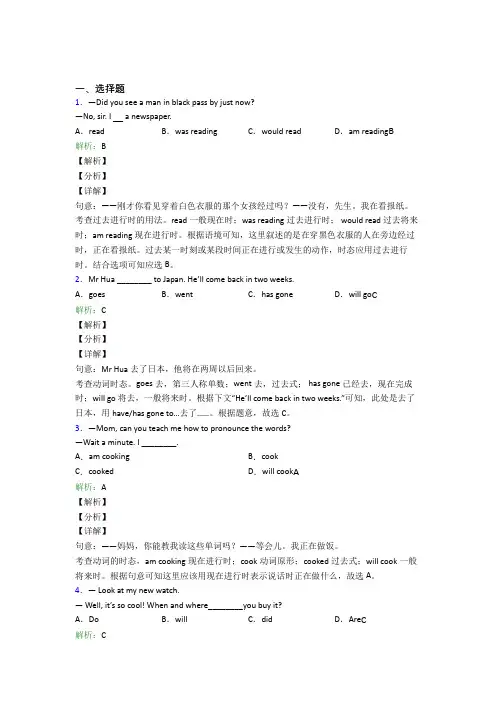
一、选择题1.—Did you see a man in black pass by just now?—No, sir. I a newspaper.A.read B.was reading C.would read D.am reading B解析:B【解析】【分析】【详解】句意:——刚才你看见穿着白色衣服的那个女孩经过吗?——没有,先生。
我在看报纸。
考查过去进行时的用法。
read一般现在时;was reading过去进行时; would read过去将来时;am reading现在进行时。
根据语境可知,这里叙述的是在穿黑色衣服的人在旁边经过时,正在看报纸。
过去某一时刻或某段时间正在进行或发生的动作,时态应用过去进行时。
结合选项可知应选B。
2.Mr Hua ________ to Japan. He’ll come back in two weeks.A.goes B.went C.has gone D.will go C解析:C【解析】【分析】【详解】句意:Mr Hua 去了日本,他将在两周以后回来。
考查动词时态。
goes去,第三人称单数;went去,过去式; has gone已经去,现在完成时;will go将去,一般将来时。
根据下文“He’ll come back in two weeks.”可知,此处是去了日本,用have/has gone to…去了……。
根据题意,故选C。
3.—Mom, can you teach me how to pronounce the words?—Wait a minute. I ________.A.am cooking B.cookC.cooked D.will cook A解析:A【解析】【分析】【详解】句意:——妈妈,你能教我读这些单词吗?——等会儿。
我正在做饭。
考查动词的时态,am cooking现在进行时;cook动词原形;cooked过去式;will cook一般将来时。
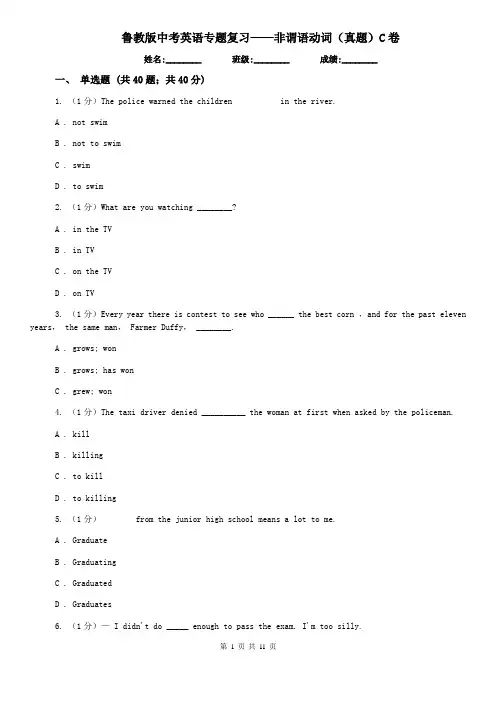
鲁教版中考英语专题复习——非谓语动词(真题)C卷姓名:________ 班级:________ 成绩:________一、单选题 (共40题;共40分)1. (1分)The police warned the children in the river.A . not swimB . not to swimC . swimD . to swim2. (1分)What are you watching ________?A . in the TVB . in TVC . on the TVD . on TV3. (1分)Every year there is contest to see who ______ the best corn ,and for the past eleven years, the same man, Farmer Duffy, ________.A . grows; wonB . grows; has wonC . grew; won4. (1分)The taxi driver denied __________ the woman at first when asked by the policeman.A . killB . killingC . to killD . to killing5. (1分)from the junior high school means a lot to me.A . GraduateB . GraduatingC . GraduatedD . Graduates6. (1分)— I didn't do _____ enough to pass the exam. I'm too silly.— Cheer up! _______.A . well; Never mindB . well; Don't lose heartC . good; Never mindD . good; Don't lose heart7. (1分)I can't stand _______ the noisy music,let him _______ it.A . hearing, stopB . to hear,stopC . hearing,to stopD . to hear, to stop8. (1分)—Tom, do you think we should make contributions to ____________ the environment ?—Sure. Our teachers often tell us ___________ a greener person.A . protect, to beB . protecting, to beC . protecting, being9. (1分)—I'm sorry about yesterday.—Don't worry about it. It's never just one person's fault. We should think about ______better next time.A . how can we do itB . how we can do itC . how can they do itD . how they can do it10. (1分)Amy is good at ________ stories.A . tellB . tellsC . telling11. (1分)—What is the end of the story?—The person with theft was seen in court.A . was charged; appearB . charged; to appearC . was charged; to appearD . charged; appear12. (1分)It often takes me much time basketball with my friends.A . to playB . playC . playingD . plays13. (1分)They have no paper_______.A . to writeB . to write withC . write onD . to write on14. (1分)— Would you like something to drink?— Thanks, but I don't want ________ any ________.A . drink; drinkB . to drink; drinksC . to drink; drinkingD . drink; drinks15. (1分)Would you please_______ for the old woman, young man?A . make a roomB . make roomC . making a roomD . make rooms16. (1分)The police ask us ______ the bus with gas(汽油) because it is dangerous.A . not to get onB . to get onC . not to get offD . get on17. (1分)My father used to after dinner, but now he is used to TV.A . walk; watchB . walking; watchingC . walk; watchingD . walking; watch18. (1分)He tells me _______ what I read on the Internet.A . not believeB . don't believeC . to not believeD . not to believe19. (1分)Tony,don't forget your homework to me after school.A . bringingB . to bringC . takingD . to take20. (1分)I don't like to be an artist, I'd rather a singer.A . beB . doC . amD . is21. (1分)It took the man less time to fly to Xi'an than it _______ there.A . did to driveB . was drivingC . does to driveD . did driving22. (1分)Lucy likes English very much . She does her best _____it well.A . to learnB . learnC . learningD . is learning23. (1分)The Palace Museum is the best place ______I've ever visited.A . thatB . whichC . where24. (1分)I'll give a talk tomorrow. I'm thinking about _______.A . what to sayB . how to sayC . what can I sayD . how can I say25. (1分) a book in the library, enter a key word into the computer.A . To findB . FindC . To findingD . Finding26. (1分)Our teacher often tells us in the river. It's dangerous.A . not swimB . not to swimC . to swimD . swimming27. (1分)I am very sleepy. I tried _______my eyes open, but I couldn't.A . keepingB . having keptC . to have keptD . to keep28. (1分)My parents promise ______ it to the teacher.A . don't tellB . not tellC . not to tellD . to not tell29. (1分)We had no choices _____________ home, for the last bus went before we arrived.A . but walkB . but to walkC . but walkingD . but to walking30. (1分)If you want to be famous, there is still a long way ______A . goB . goingC . to goD . goes31. (1分)His mother always makes him his own room.A . cleanB . to cleanC . cleansD . cleaning32. (1分)—Are you going to buy a new camera?—Yes. But there are so many cameras that I can't decide______________.A . how to useB . where to sellC . which to buy33. (1分)一 Many students don't know _____ stress and become worried.一 I think they should communicate more with their parents.A . how deal withB . how dealing withC . how to deal withD . how to dealing with34. (1分)Mr. Wang didn't tell me the time he arrived, so I don't know to meethim.A . whereB . whenC . whyD . who35. (1分)—Mum, can I have something _______?—Oh, dear. You can only drink some water. There is _______ in the kitchen.A . to drink; nothing elseB . drinking; something elseC . to eat; something elseD . eating; nothing else36. (1分)The meeting next week is sure to be a great success.A . to take placeB . to be taken placeC . to have taken place37. (1分)Chinese athletes did a great job in 2012 London Olympics. It can encourage post-90s(90后) _______.A . work harderB . works harderC . to work harderD . to working harder38. (1分)Don't make him all the time. Tell him a rest.A . to work; to haveB . work; haveC . work; to have39. (1分)She pretended _______ me when I passed by.A . not to seeB . not seeingC . to not seeD . having not seen40. (1分)Seeing so many people on the street,Tracy stopped ________ a look.A . to haveB . haveC . havingD . has参考答案一、单选题 (共40题;共40分)1-1、2-1、3-1、4-1、5-1、6-1、7-1、8-1、9-1、10-1、11-1、12-1、13-1、14-1、15-1、16-1、17-1、18-1、19-1、20-1、21-1、22-1、23-1、24-1、25-1、26-1、27-1、28-1、29-1、30-1、31-1、32-1、33-1、34-1、35-1、36-1、37-1、38-1、39-1、40-1、第11 页共11 页。
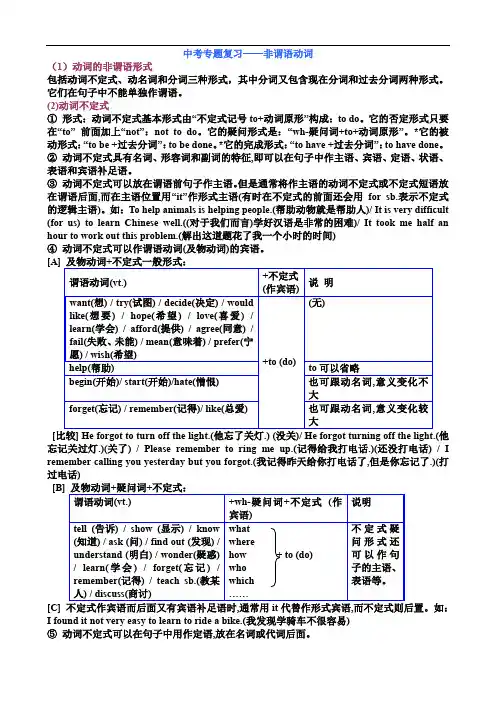
中考专题复习——非谓语动词(1)动词的非谓语形式包括动词不定式、动名词和分词三种形式,其中分词又包含现在分词和过去分词两种形式。
它们在句子中不能单独作谓语。
(2)动词不定式① 形式:动词不定式基本形式由“不定式记号to+动词原形”构成:to do 。
它的否定形式只要在“to” 前面加上“not”:not to do 。
它的疑问形式是:“wh -疑问词+to+动词原形”。
*它的被动形式:“to be +过去分词”:to be done 。
*它的完成形式:“to have +过去分词”:to have done 。
② 动词不定式具有名词、形容词和副词的特征,即可以在句子中作主语、宾语、定语、状语、表语和宾语补足语。
③ 动词不定式可以放在谓语前句子作主语。
但是通常将作主语的动词不定式或不定式短语放在谓语后面,而在主语位置用“it”作形式主语(有时在不定式的前面还会用for sb.表示不定式的逻辑主语)。
如:To help animals is helping people.(帮助动物就是帮助人)/ It is very difficult (for us) to learn Chinese well.((对于我们而言)学好汉语是非常的困难)/ It took me half an hour to work out this problem.(解出这道题花了我一个小时的时间) ④ 动词不定式可以作谓语动词(及物动词)的宾语。
[他忘记关过灯.)(关了) / Please remember toring me up.(记得给我打电话.)(还没打电话) / I remember calling you yesterday but you forgot.(我记得昨天给你打电话了,但是你忘记了.)(打过电话)[C] I found it not very easy to learn to ride a bike.(我发现学骑车不很容易) ⑤ 动词不定式可以在句子中用作定语,放在名词或代词后面。
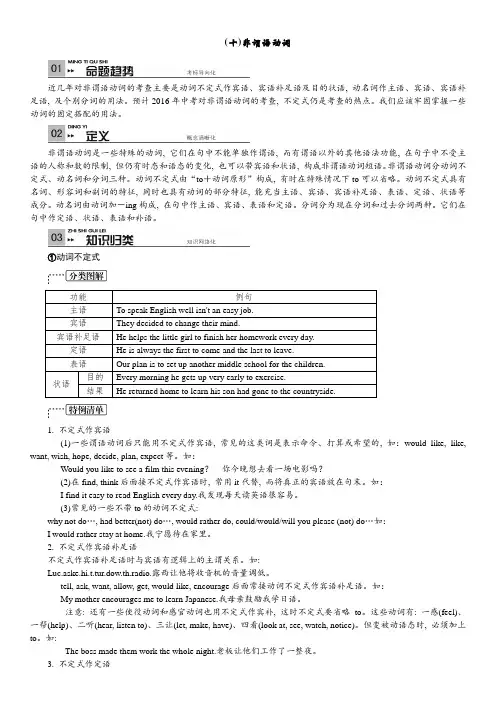
(十)非谓语动词近几年对非谓语动词的考查主要是动词不定式作宾语、宾语补足语及目的状语, 动名词作主语、宾语、宾语补足语, 及个别分词的用法。
预计2016年中考对非谓语动词的考查, 不定式仍是考查的热点。
我们应该牢固掌握一些动词的固定搭配的用法。
非谓语动词是一些特殊的动词, 它们在句中不能单独作谓语, 而有谓语以外的其他语法功能, 在句子中不受主语的人称和数的限制, 但仍有时态和语态的变化, 也可以带宾语和状语, 构成非谓语动词短语。
非谓语动词分动词不定式、动名词和分词三种。
动词不定式由“to+动词原形”构成, 有时在特殊情况下to可以省略。
动词不定式具有名词、形容词和副词的特征, 同时也具有动词的部分特征, 能充当主语、宾语、宾语补足语、表语、定语、状语等成分。
动名词由动词加-ing构成, 在句中作主语、宾语、表语和定语。
分词分为现在分词和过去分词两种。
它们在句中作定语、状语、表语和补语。
①动词不定式功能例句主语To speak English well isn't an easy job.宾语They decided to change their mind.宾语补足语He helps the little girl to finish her homework every day.定语He is always the first to come and the last to leave.表语Our plan is to set up another middle school for the children.状语目的Every morning he gets up very early to exercise.结果He returned home to learn his son had gone to the countryside.1. 不定式作宾语(1)一些谓语动词后只能用不定式作宾语, 常见的这类词是表示命令、打算或希望的, 如:would like, like, want, wish, hope, decide, plan, expect等。
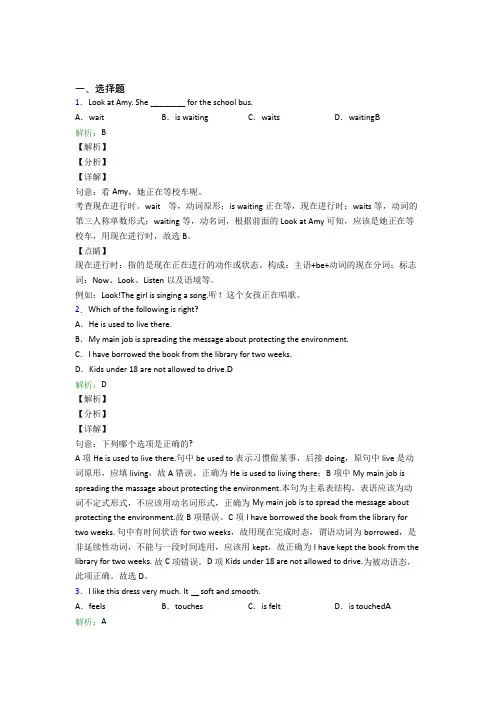
一、选择题1.Look at Amy. She ________ for the school bus.A.wait B.is waiting C.waits D.waiting B解析:B【解析】【分析】【详解】句意:看Amy,她正在等校车呢。
考查现在进行时。
wait 等,动词原形;is waiting正在等,现在进行时;waits等,动词的第三人称单数形式;waiting等,动名词,根据前面的Look at Amy可知,应该是她正在等校车,用现在进行时,故选B。
【点睛】现在进行时:指的是现在正在进行的动作或状态。
构成:主语+be+动词的现在分词;标志词:Now、Look、Listen以及语境等。
例如:Look!The girl is singing a song.听!这个女孩正在唱歌。
2.Which of the following is right?A.He is used to live there.B.My main job is spreading the message about protecting the environment.C.I have borrowed the book from the library for two weeks.D.Kids under 18 are not allowed to drive.D解析:D【解析】【分析】【详解】句意:下列哪个选项是正确的?A项He is used to live there.句中be used to 表示习惯做某事,后接doing,原句中live是动词原形,应填living,故A错误,正确为He is used to living there;B项中My main job is spreading the massage about protecting the environment.本句为主系表结构,表语应该为动词不定式形式,不应该用动名词形式,正确为My main job is to spread the message about protecting the environment.故B项错误。
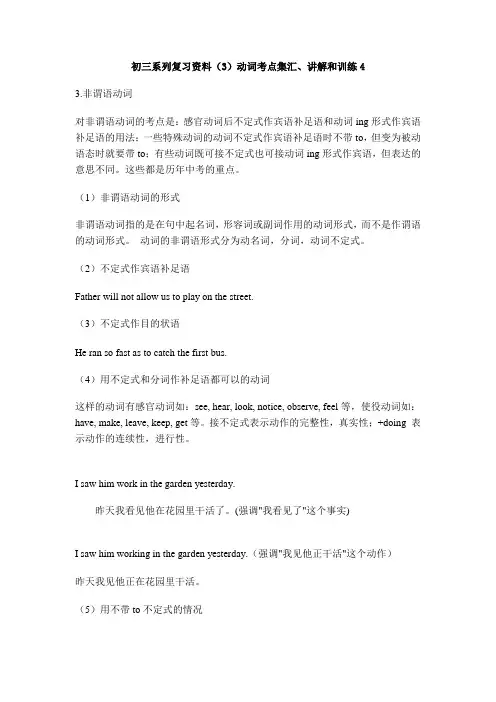
初三系列复习资料(3)动词考点集汇、讲解和训练43.非谓语动词对非谓语动词的考点是:感官动词后不定式作宾语补足语和动词ing形式作宾语补足语的用法;一些特殊动词的动词不定式作宾语补足语时不带to,但变为被动语态时就要带to;有些动词既可接不定式也可接动词ing形式作宾语,但表达的意思不同。
这些都是历年中考的重点。
(1)非谓语动词的形式非谓语动词指的是在句中起名词,形容词或副词作用的动词形式,而不是作谓语的动词形式。
动词的非谓语形式分为动名词,分词,动词不定式。
(2)不定式作宾语补足语Father will not allow us to play on the street.(3)不定式作目的状语He ran so fast as to catch the first bus.(4)用不定式和分词作补足语都可以的动词这样的动词有感官动词如:see, hear, look, notice, observe, feel等,使役动词如:have, make, leave, keep, get等。
接不定式表示动作的完整性,真实性;+doing 表示动作的连续性,进行性。
I saw him work in the garden yesterday.昨天我看见他在花园里干活了。
(强调"我看见了"这个事实)I saw him working in the garden yesterday.(强调"我见他正干活"这个动作)昨天我见他正在花园里干活。
(5)用不带to不定式的情况使役动词如:let, have, make等和感官动词如:see, watch, hear, listen to, smell, feel, find 等后作宾补,省略to。
在被动语态中则to不能省掉。
(6)接动名词与不定式意义不同1) stop to do停止,中断做某事后去做另一件事。
stop doing停止做某事。
Name Group Class语法专项复习——非谓语动词【Get ready before class】知识点总结:在句子动词的基本用法是作谓语。
当句中已经有了谓语动词了,要选或要填的动词就只能用非谓语形式了。
非谓语形式有三种:1. 动词不定式:to do2. 动词的ing:doing3. 动词的过去分词:done。
否定形式:在非谓语动词前加not, never, 即not / never to do, not / never doing一、非谓语动词的做题步骤1. 判定是否用非谓语形式。
方法:看看句子中是否已有了谓语动词了。
2. 找非谓语动词的逻辑主语。
方法:非谓语动词的逻辑主语一般是句子的主语。
3. 判断主被动关系。
方法:非谓语动词与其逻辑主语是主动还是被动关系。
4. 判断时间关系。
方法:分析句子,看看非谓语动词所表示的动作发生在谓语动作之前、之后还是同时。
之前常用done; 之后常用to do; 同时常用doing。
二、常见搭配Doing sth.1 完成某事情finish doing sth.2 喜欢做某事like / enjoy doing sth.3 讨厌做某事hate doing sth.4 去游泳/ 远足go swimming / hiking5 购物/看书do some shopping/reading6 买票划船buy tickets for boating7 掰完玉米后after picking corns8 擅长做某事be good at doing sth.9 做某事遇了些问题have some problems (in) doing sth.10 获得乐趣have fun doing sth.11 忙于干某事be busy doing sth.12 感谢您做某事thank you for doing sth.13 做某事怎样?What /How about doing sth.?14 跑步有益健康。
九年级英语非谓语动词专项复习一、非谓语动词1.—You can only keep the books for two weeks, Tom. Remember ____them on time.—I will.A. returnB. returningC. to return【答案】 C【解析】【分析】句意:—这些书你能借两周,汤姆,记住按时归还它们。
—我会的。
remember to do记住去做某事; remember doing记得做过某事。
根据You can only keep the books for two weeks, 可知借了之后要记得去还,记得去做某事要用to do,故选C。
【点评】考查remember的用法。
牢记remember to do和remember doing的不同。
2.To live a low-carbon life, we must remember ________ the lights when we leave the room.A. to turn offB. turning offC. not to turn off【答案】 A【解析】【分析】句意:要过低碳生活,我们必须记住离开房间时要关掉灯。
remember (not)to do sth.忘记要做的事;remember doing sth.忘记已经做过的事。
根据句末when we leave the room.可知关灯的动作还没有做,此处表示肯定含义,要用不定式的肯定式,故选A。
【点评】考查动词remember的固定搭配。
根据所表示的含义选择正确的搭配。
3.—So beautiful flowers! I can't decide _____ for my mom.—For Mother's Day, it can't be better to take some carnations(康乃馨).A. when to chooseB. which to chooseC. how to choose【答案】 B【解析】【分析】句意:——如此漂亮的花。
英语中考归纳复习专题:非谓语动词【非谓语动词】非谓语动词是指在句中充当除谓语以外的其他句子成分的动词形式,可作主语、宾语、表语、定语、状语、补足语等,在句中起名词、形容词、副词的作用。
非谓语动词包含三种形式:动词不定式、动名词和分词(现在分词和过去分词)。
【动词不定式】1.动词不定式的基本形式为:to+动词原形,其否定形式为:not to+动词原形。
(要注意省略to的动词不定式)2.动词不定式的用法第 1 页共16 页第 2 页共16 页巧记口诀:常见的只跟不定式作宾语的动词决定学会有希望(decide,learn,wish,hope,expect), 同意计划莫假装(agree,plan,pretend),胆敢拒绝会失败(dare,refuse,fail),第 3 页共16 页准备设法来帮忙(prepare,manage,help),提供请求负担起(offer,beg,afford),答应安排理应当(promise,arrange,be supposed),以上后跟不定式,劝君牢记永不忘。
【考点训练1】1.She volunteers there once a week ______ (help) kids learn _________ (read).2.If a Swiss(瑞士人) invites you _________ (meet) him or her at noon,then you’re expected ______ (be) there at noon.3.My brother always refuses _____ (let) me _____(watch) my favorite TV show.4.Lily plans ____ The Amazing Race(《极速前进》) tonight. ()A.watchB.watchesC.to watchD.watching5.Our teacher tells us ____ in the street because it’s too dangerous. ()A.not play soccerB.not to play soccerC.to not play soccerD.not playing soccer答案:to help to read to meet to be to let watch C B【动名词】第 4 页共16 页1.动名词由动词的-ing形式构成,其否定形式为:not+doing。
九年级英语非谓语动词知识点归纳一、选择题1.energy,turn off the lights when you leave the room.A.Saving B.Save C.To save D.Saved2.My bike is broken. I will have it________ tomorrow morning.A.fix up B.fixed up C.repairing D.to repair 3.Who are you going to have ________ the library since the designer is busy these days. A.to design B.designed C.designing D.design 4.When I eat a mooncake, I prefer ________ it into small pieces before eating rather than________ it up straight.A.to cut;eat B.cutting;eat C.to cut;to eat D.cutting;eating 5.The sadness over her father's death made it difficult for her ________ schoolwork. A.finish B.to finish C.finishing D.to finishing 6.The way our students thought of ________ the classroom clean and tidy proved to be very useful.A.to keep B.keeping C.kept D.keeps 7.Online short video apps like Douyin make________easier to do some shopping at home. A.it B.one C.this D.that 8.—How much work have you finished ______ for the coming exam?—Everything is done. I’m ready for it.A.prepared B.preparing C.to prepare D.to preparing 9.We must do everything we can __________ the students in poor areas.A.help B.helped C.helping D.to help10.—I didn’t hear you come in just now.—That’s great. I tried ________ the baby up.A.no waking B.don’t wake C.to not wake D.not to wake 11.The doctor warned the patient oily food after the operation.A.not to drink B.to drink C.not to eat D.not eat 12.Our headmaster isn’t in. I can’t find him anywhere. Did you notice him ______ the office? A.to enter B.entered C.to leave D.leave13.﹣I have a package ,but I'm too busy.﹣Why not have your cousin it for you?A.to send; send B.sent; sendC.to send; to send D.sent; to send14.Boys and girls, attention, please! We are not allowed ________ photos here.A.taking B.to take C.take D.taken 15.More TV programs, according to government officials, will be produced _____ people’s attention over food safety.A.to raise B.raising C.to rise D.rising 16.Nowadays, teachers ought to consider ________ more time on teaching research.A.spend B.to spend C.spending D.spent 17.(2017届山东省滨州市滨城区九年级第二次模拟)David enjoys ____ music at weekends, but I prefer ________ for a picnic.A.listening to;go out B.listening to;to go outC.to listen to;to go out D.listen to;going out18.Helen was made the task in two days.A.finish B.to finishing C.finished D.to finish 19.—We set World Reading Day ________ teens to form a good reading habit.—Nowadays, people are more aware of the importance of reading.A.to encourage B.encouraging C.encouraged D.encourage 20.一Have you got the tickets for the concert?一Not yet,I didn't realize difficult it was the tickets.A.what; to get B.what; getting C.how; to get D.how; getting21.—Do you often hear Lucy ________in her room?—Yes, listen! Now we can hear her ________ in her room.A.sing; sing B.singing; singing C.singing; sing D.sing; singing 22.I must get my homework ____,A.done B.does C.do D.did23.— Listen! Can you hear something?— Yeah, it could be some children outside.A.were playing B.playingC.to play D.play24.I like watching people _____in the street.A.walking B.walked C.to walk D.be walking25.My watch doesn’t work. I must have it ________.A.Repairing B.to repair C.repair D.repaired26.________ as a main dish, this soup is full of meat, vegetables and noodles.A.Serve B.To serve C.Served D.Serving 27.Smart phones ________ by Huawei are getting more and more popular around the world. A.made B.are made C.to make D.making28.The audience enjoyed the lecture ________ by Hans and Einstein joined in the applause too. A.given B.giving C.to give D.gave29.Most of the artists____________ to the party were from South Africa.A.invite B.to invite C.invited D.inviting 30.Fans all over the country are talking about ________ this football team has never won any match and ________ to do with it.A.whether; how B.why; how C.whether; what D.why; what 31.These young trees will require ________carefully.A.to look after B.being looked after C.having looked after D. looking after 32.What a terrible thing! There is a ________ dog ________ on the ground.A.die, lie B.dead, lying C.death, lay D.dying, lie 33.When I walked past the park, I saw some old people _________ Chinese Taiji.A.do B.doing C.did D.are doing 34.—How do you feel about people who keep you ____?—They drive me ____.A.wait; excited B.to wait; fun C.waiting; mad D.waiting; happy 35.—What are you talking about?—Some pictures ________ yesterday.A.were taken B.took C.taken D.have been taken 36.—Tom, have you ever read the book A Tale of Two Cities ________ by Charles Dickens?—Yes, I finished reading it last winter vacation.A.wrote B.to write C.writing D.written 37.Look! There _______ so many people _________here. Do you know what has happened? A.is, standing B.are, are standing C.are, standing38.If you want to make yourself ______, you should speak clearly and slowly.A.to understand B.understood C.understand D.understanding 39.My computer doesn’t work. I decide to have it ______.A.repair B.repaired C.to repair D.repairing 40.The film Hello, Mom! is such a moving film that I think it is well worth________ .A.to watch B.watching C.watches D.watch 41.—Nowadays, many young people get used to________ late every day.—Exactly. But that’s not a good habit.A.stay up B.staying up C.stay out D.staying out 42.Paul is really considering________himself to________ those children in the earthquake-hit area.A.to devote, teaching B.devoting, teaching C.devoting, teach D.to devote, teach 43.—At weekends, my parents often go cycling with me around the Fishmouth Wetland Park.—That's great! But my parents are too busy ________ operations to spare me any time.A.to do B.done C.doing D.do44.The bad weather will last for a week. So I advise you ________ off the sports meeting. A.to put B.to be put C.put D.putting45.—I prefer ________ with a pen to ________ on the computer, because I type so slowly. —So do I.A.write; typing B.to write; to type C.writing; to type D.writing; typing 46.When I was young I liked to listen to the radio, ________ for my favourite song.A.wait B.waited C.waiting D.so that wait 47.—What do you remember about Grade 7?―I remember________a prize in the school writing competition.A.to win B.win C.winning D.won 48.—How much do you know "996" schedule?—Well, it means _____________from 9 am to 9 pm, six days a week.A.working B.worked C.to work D.works 49.—What’s your plan for the coming summer holiday?—I’ll devote as much time as I can some voluntary work.A.to do B.to doing C.do D.doing50.He made up his mind to devote his life________ pollution ________happily.A.to prevent; from living B.to prevent; to liveC.to preventing; from living D.to preventing; to live51.This educational CD-ROM makes _____ easier for you to learn English. After using it for a month, you’ll have no difficulty ________ with foreigners.A.that; to talk B.it; to talkC.that; talking D.it; talking52.(题文)The manager is used to _____________the computer to check e-mails every morning.A.turn on B.turning on C.turn off D.turning off53.—Tom, have you ever read the book A Take of Two Cities written by Charles Dickens?—Yes, I finished ________ it last summer vacation.A.read B.reading C.to read D.reads54.My brother would rather spend time _________ in the library _________ talk with friends on WeChat.A.read; in B.reading; in C.reading; than D.to read; than 55.The girl is often heard ________ in the music room. Her voice sounds beautiful. A.practice singing B.practiced singing C.to practice singing D.to practice sing 56.Peter enjoys ________ pictures in the country on Sundays.A.draw B.drawing C.to draw D.drew 57.—Were you born in Baiyin City?—No, I wasn’t. But I have been used ________ in the city since I moved here ten years ago. A.live B.to live C.living D.to living 58.People are advised to avoid ________ their eyes, nose and mouth with unwashed hands. A.touch B.touched C.touching D.to touch 59.Sally practices _________ the guitar very hard for the coming contest next month.A.play B.plays C.playing D.to play 60.China has successfully prevented the Covid-19 from _______ through the country. A.spread B.to spread C.spreading D.spreads【参考答案】一、选择题1.C解析:C【详解】句意:为了节约能源,离开房间之前关掉点灯。
九年级英语下学期专题复习一体化教学案一、热身练习1. The old men enjoy _____ (listen) to the singing of the birds in the park.2.My sister is interested in _______ in her free time.A. watch TVB. reading booksC. listening musicD. plays basketball3.Let me ______(help) you _______ (water) the flowers.4. I saw him _______ into the small store.A. wentB. goingC. to goD. has gone5.He is good at______.A.singingB.singC.singsD.to sing二、思维导图三、直击考点考点一不定式✧Would rather宁愿做…✧would you please✧情态动词+do✧助动词+do◆区分下列词组:➢see sb. doing/ do sth.➢hear sb. doing/ do sth.➢watch sb. doing/ do sth.➢notice sb. doing/ do sth.感官动词see, watch, look at, notice, hear, listen to, feel,+ do表示动作的完整性,+doing 表示动作的进行性。
注意:被动语态中不能省去to。
(四)特殊词精讲考点二动名词①动词+doing ②介词+doing(一)只能接-ing作宾语的动词口诀:喜欢花费忙着想象,忍不住想要结束练习,错过建议,保持介意,值得考虑✧enjoy doing sth. 喜欢做某事✧spend...doing sth. 花费…做某事✧be busy doing sth. 忙于做…✧imagine sb. doing sth. 想象…做某事✧can't help doing sth. 忍不住做某事✧feel like doing sth. 想要做某事✧finish doing sth. 完成做某事✧practice doing sth. 练习做某事✧miss doing sth. 错过做某事✧suggest doing sth. 建议做某事✧keep (on) doing sth. 保持(继续)做某事✧mind doing sth. 介意做某事✧be worth doing sth. 值得做某事✧consider doing sth. 考虑做某事(二)介词+doing常考介词: at, in, on,of, off, for, from, up, about, without ,to 等等.✧be good at doing sth 擅长做某事✧be interested in doing sth. 对做某事感兴趣✧insist on doing 坚持做某事✧be used for doing sth. 被用来做某事✧thank sb. for doing sth. 谢谢某人做某事✧be tired of doing sth. 厌烦做某事✧be afraid of doing sth. 害怕做某事✧put off doing 推迟做某事✧stop sb. from doing sth. 阻止某人做某事✧give up doing sth. 放弃做某事✧without doing sth. 没有做某事✧think about doing sth. 考虑做某事✧What ∕How about doing 做某事怎么样?◆注意注意:此to 非彼to✧look forward to doing sth. (盼望)✧pay attention to doing sth. (注意)✧be used to doing sth. (习惯于)✧prefer doing sth to doing sth. (更喜欢)✧devote to doing sth (致力于)✧stick to doing (坚持做)考点三分词(一)分词分为现在分词和过去分词两种。
非谓语动词专题复习一、要点揭示:非谓语动词的考查,初中阶段以动词不定式(to do)为主,同时也涉及其他非谓语动词如:动名词(doing)、现在分词(doing)过去分词(done)。
非谓语动词在句中除不能独立做谓语外,可以做主语、表语、宾语、宾语补足语、定语、状语等其他成分。
以上例题就是对非谓语动词句法作用的考查。
在单项选择题中由于命题人在试题的选择项中,使三种非谓语动词的形式全部出现,从而更加加大了试题的迷惑度;完成句子或翻译句子大多考查了与非谓语动词有关的短语或句型。
下面以动词不定式为主线将非谓语动词的句法作用做一归纳。
二、知识结构1、做主语1)不定式做主语:例如:To learn English well is not hard. To give is better than to receive.注:不定式做主语常用形式主语it代替。
构成句型:It is +adj. +(for sb.)+ to do。
如:It’s hard for you to do it well.请动手:把以上两句用该句型来改写。
请思考:It is nice of you to give me so much help.句中为什么用of而不用for呢?2)动名词做主语:例如:Reading in the sun is bad for your eyes.请思考:该句中的动名词是否也可用it代替呢?2、做表语1)不定式做表语如:To eat is to live, but to live is not to eat. My job is to sell computers.My wish is to fly to the moon.2)动名词或现在分词做表语。
如:My hobby is playing basketball. The news is very interesting.3)过去分词做表语如:My bike was broken. I was satisfied at the news. His mother is worried about him. 3、作宾语非谓语动词做宾语是中考的重要考查点,该考点涉及动词不定式和动名词做宾语的区别。
下面以不同类型的动词为线索,加以说明。
1)只能接动词不定式做宾语的动词:decide, hope, agree, choose, fail, wish, learn等。
构成句型:动词+to do。
如:We agreed to meet him on Sunday.请动手:用以上动词各造一句。
2)既能接不定式又能接动名词做宾语但意义区别不大的动词:like, love, begin, start, hate等。
构成句型:动词+to do和动词+doing 如:I will start to work(working)tomorrow. Do you like to play(playing) football?请动手:用以上动词各造两句体会其用法。
注:下面情况一般只能用不定式做宾语。
I. Would you like/love 后,表示特定动作时。
如:Would you like to leave a message?II.当谓语已经用了进行时态时。
如:It’s beginning to rain.III.在begin后非谓语动词由某些状态动词构成时。
如:We began to think of this question. She began to believe his story.3)接不定式和动名词做宾语意思不同的动词:I. need和want 跟动名词时表示被动意义,跟不定式表示主动意义。
如:These trees need watering(to be watered). We need to go there.请动手:用want造两个句子加以体会。
II. remember, forget, stop, go on 后跟动名词表示动作发生在这些动词之前,跟不定式表示动作发生在这些动词之后。
试比较以下两组句子体会不同:Go on reading.和After he finished the composition, he went on to do his homework..She stopped speaking.和He stopped to speak to Martin.请思考:最后一句中不定式to speak在句中还可以理解为做什么成分?III. try和mean跟动名词和不定式做宾语意义差别很大。
try doing 表示“试着做某事”,而try to do表示“设法做某事”。
mean doing表示“意思是”、“意味着”,mean to do是“企图、打算”请动手:翻译以下句子:A、他试着用手去摘那个苹果但是失败了。
B、他设法用另一种方法解这个题,但不起效果。
C、这意味着帮助你。
D、我意在帮助你。
4)think, make, find, feel等动词,跟不定式做宾语时常用形式宾语it代替,后面常有形容词做宾语补足语,构成句型:动词+it+ adj.+ to do。
如:I found it very important to learn English well.请动手翻译句子:人们发现保护环境越来越重要。
5)其他:I.只能接动名词做宾语的动词:enjoy, finish, keep(on), miss, mind, practice, suggest等,构成句型:动词+doing。
如:After he finished reading the novel, he began to watch the play.请动手:用以上动词各造一句。
II.介词后只能接动名词做宾语:请记忆下列句型或短语并造句体会:thanks for doing;what/how about doing;feel like doing;pay attention to doing;make a contribution to doing;stop/prevent/keep/protect sb./sth. from doing;be busy (in) doing;spend st.(in)doing;give up等。
4、做宾语补足语1)接带to的不定式做宾语补足语的动词:ask, tell, get, wish, like, want, teach, know, understand, allow, remind等。
句型:动词+ sb./sth.+ to do.如:Teachers should allow usto have a day off every week.请思考:该句型的被动句是考试的重点考查点,一般构成什么句型呢?2)动词不定式做宾语补足语时to须省略的动词:I.使役动词make, have, let:句型:动词+sb./sth.+ do。
如:The boss made his workers work over 10 hours a day.注:这些句子在变为被动句后,省略的to要补上,且不定式也由原先在句中做宾语补足语变为做主语补足语。
如上句变为被动句后为:His workers were made to workover 10 hours a day (by the boss). 该点也是中考的重要考查点,请务必掌握。
以上动词也可接过去分词done做宾语补足语,表示:“使……被……”,构成句型:动词+sb./sth.+ done。
如:We had many photos taken in the park.. The king made their tombsbuilt many years ago.II.感官动词see, hear, listen (to), feel:句型1:动词+sb./sth.+do.如:I often hear them sing this song.请思考:这种句子变为被动句后不定式有什么变化?请动手翻译下句并变为被动句:我经常听到这个女孩在隔壁房间弹钢琴。
注:以上动词后也可跟现在分词做宾语补足语,构成句型:动词+sb./sth.+doing.如:I saw a wallet lying on the ground when I walked by.请思考:以上动词接现在分词doing做宾语补足语与接动词不定式to do做宾语补足语意思上有何区别?举例说明。
5、做定语:1)不定式做定语常置于所修饰词后,如:Do you have anything more to say?I want to find a room to live in.请思考:in 可否省略?为什么?2)现在分词doing和过去分词done也可以做定语,如:The boy standing here is my brother.(现在分词做定语)Her job was to take care of the wounded solidiers.(过去分词做定语)6、做状语1)不定式做目的状语:He went to visit his parents. We stopped to listen to the teacher.He got up at 3 o’clock in order to catch the early train.The pen is very good to write with.请思考:最后句一中的介词with 可否省略?为什么?2)不定式做原因状语:常用该句型:be+ adj.+ to do。
注:该句型中常用到下列形容词:happy, glad, pleased, angry, right, sorry, slow, clever, quick ready wrong, nice, lucky等。
如:I’m sorry to hear it. I’m pleased to know this.3)不定式做结果状语:常用句型:too…(for sb.)to… ; enough to do.如:The box is too heavy for the boy to carry. She isn’t brave enough to go out at night.请思考:该类句型转换为复合句常用哪些句型?把上两句变为复合句。
请思考:The box is too heavy for me to carry it.该句对吗?为什么?4)现在分词做状语如:He sat in the chair, reading the newspaper.(伴随情况状语)请动手用以下短语造句体会现在分词在句中做什么状语?:A、have fun doing;B、have trouble doing7、其他1)不定式的被动语态to be done:如:There are twenty more trees to be planted.He’ll go to the clinic tomorrow to be examined by the doctor.请动手:在教材中找出类似的不定式的被动结构。